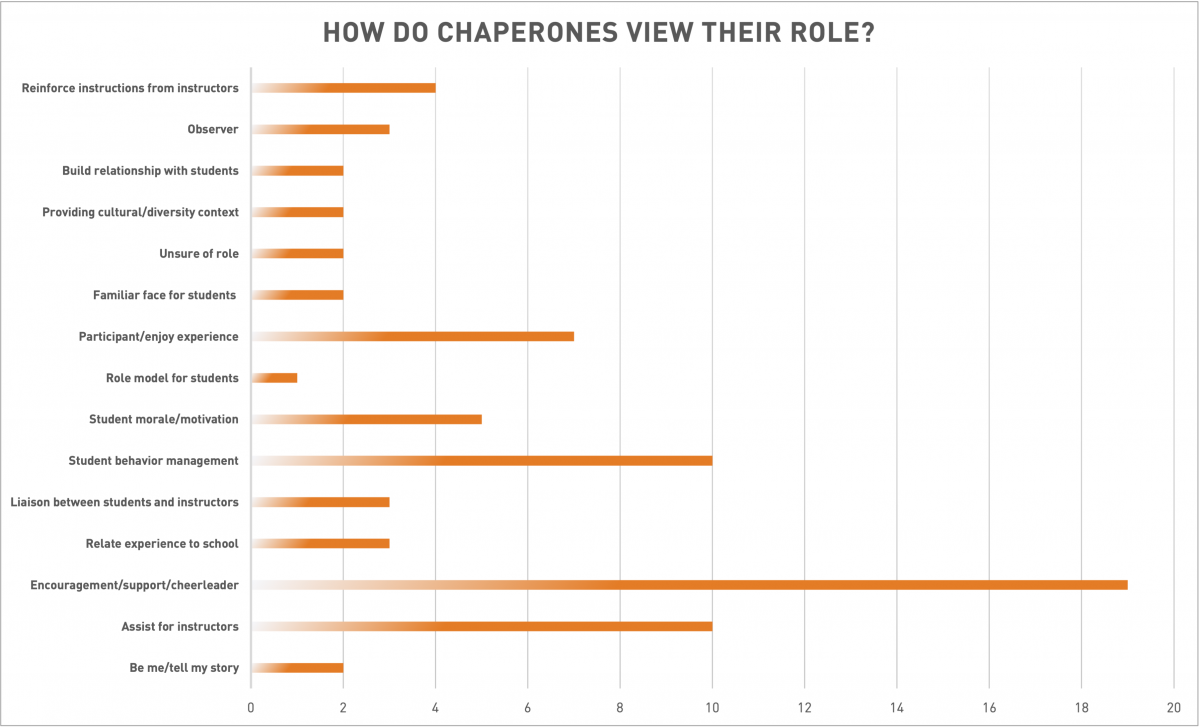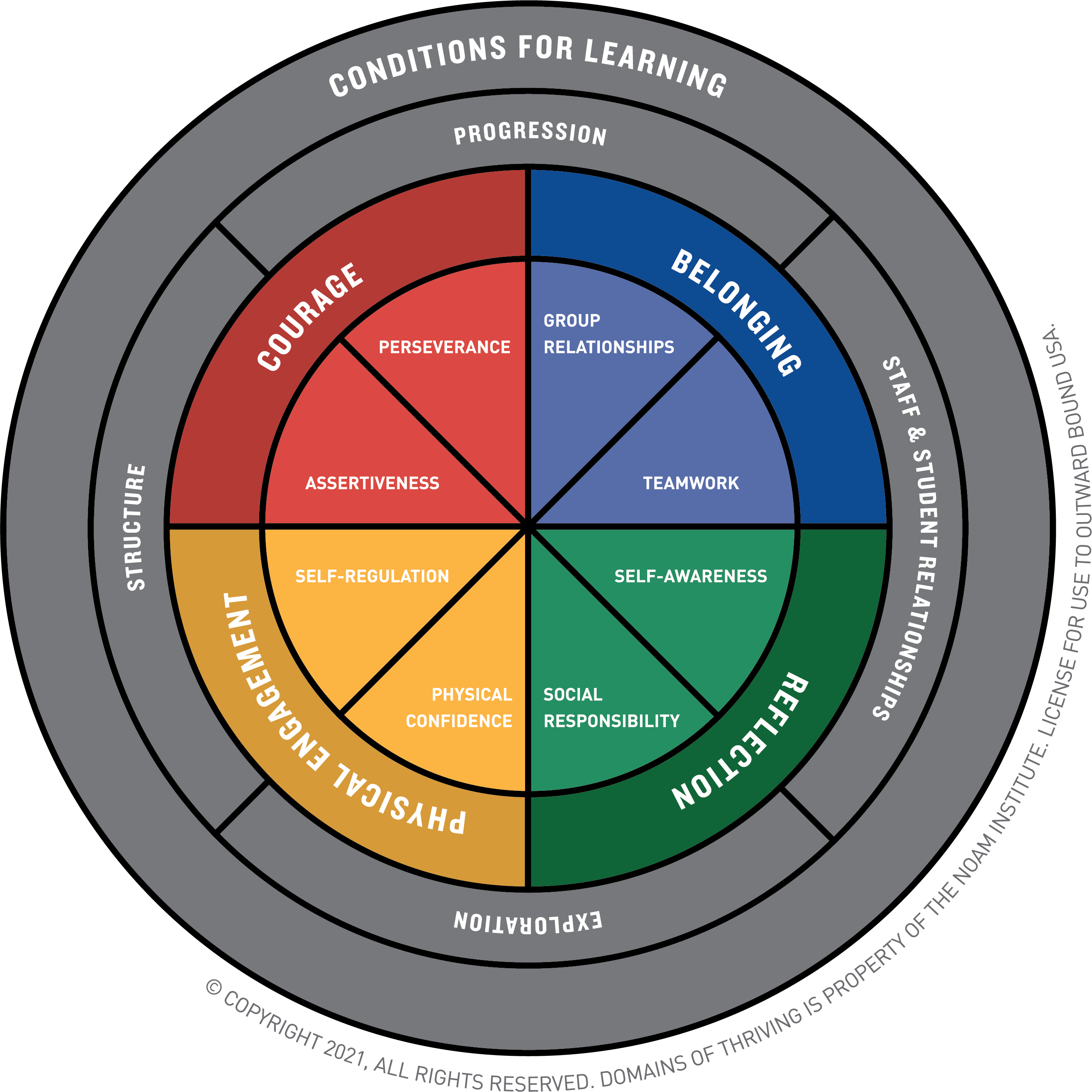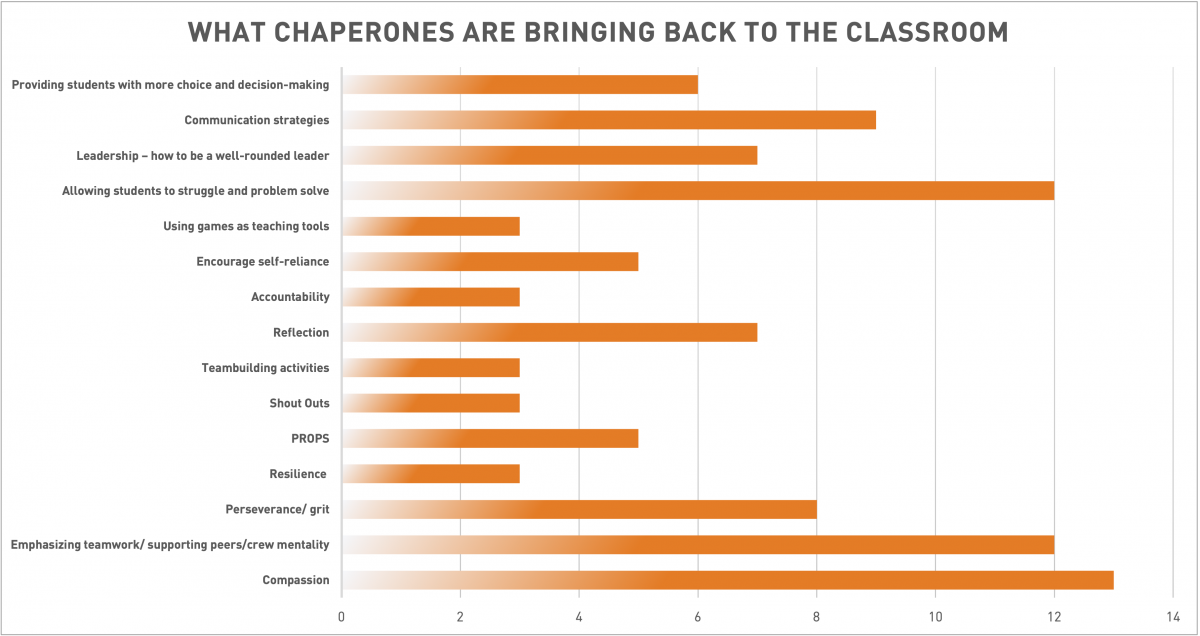SUPPORT TEACHERS AT OUTWARD BOUND
We’re so excited to have you on an expedition with us! This is a helpful guide for school chaperones before your Outward Bound expedition!
WHAT DOES IT MEAN TO BE A SUPPORT TEACHER JOINING AN OUTWARD BOUND EXPEDITION?
Your unique role brings richness to the student experience. When you join as an educational partner, you bring a wealth of skills and knowledge that can powerfully support student learning on their Outward Bound program and back into the classroom.
WHAT TO COMPLETE BEFORE YOUR EXPEDITION:
- Medical Registration Form: Find the link to complete your registration on your school's landing page.
- Pre-Course Group Summary: Find the link to complete your group's pre-course summary HERE!
Check out your school's landing page to help answer all questions for your students and parents.
Have More Questions? Check out the FAQ's below. The weekend before you head out, your Outward Bound Instructor will call you to answer any last-minute questions. Be on the lookout for that call!
If you need to contact us beforehand, reach out to the Admission Department (admissions@outwardboundchesapeake.org) for medical follow up, or our Education Department (kreynolds@outwardboundchesapeake.org) for how you can best support your students.
BACKPACKING & ROCK CLIMBING
CANOEING
YOUR ROLE AS A SUPPORT TEACHER ON AN OUTWARD BOUND EXPEDITION:
Transferring learning from expedition experiences back to “real life” is our main goal.
Expedition challenges serve as metaphors for life. You’ll see connections between expedition learning and classroom behaviors much more easily than students will. On course—and ESPECIALLY when you’re back in the classroom—help students draw connections from the wilderness to their home lives as much as possible. During debriefs, jump into help make connections.
Remember, you can help students make connections to their home/school lives by asking questions and co-investigating instead of telling students what you want them to know.
Instructors will rely on you to help manage activities, maintain student structures, or create behavior plans. It is important that this is a consistent system, which requires an ongoing conversation between you and your instructor team.
Expedition flow can offer great opportunities to support students individually. Notice how they show up during learning experiences and respond to what you notice! Then, appreciate them if they change their behavior and engage in some way—everyone thrives on knowing that someone notices they are participating.
Student disagreements and struggle can be powerful learning moments!
Be strategic when you’re jumping in to help or manage students. Sometimes, instructors will let students struggle longer, or work through a chaotic situation, which creates opportunities for students to form their own structure and conflict-management strategies.
During group discussions, it’s OK to share an interesting question or an idea, but hold back from taking over the discussion, or contributing more than a couple times. Our goal is to help empower students to share their ideas and think together, so it’s important to listen more than speak!
You have a unique opportunity ahead of you! Coming on course as a support teacher gives you the opportunity to see your students outside of their normal routines, trying new things, solving problems, and setting goals.
As a cheerleader and motivator on course, your main role is a supporter rather than enforcer. Use downtime and hiking time to learn about your students’ lives, hopes, and ideas! Take the opportunity to observe, take notes, and initiate check-ins with individual students about strengths and growth opportunities.
Your training and previous experience with these students can be an invaluable resource on the course. Use check-ins with your instructor team to share information and ideas as you see the opportunity!

COURSE EXPECTATIONS
Your Outward Bound Instructor will do their best to inform, care for, and support you! They know this might be a very new experience for you. We ask that you help them help you with a few basic expectations.
We need you healthy and engaged! And we don’t expect you to be a superhero. Be ok to be a student. Take time to step away from the group if needed, spend time packing your own things with care each morning, and enjoy the scenery! Take care of your own essential needs before your students.
Actively communicating with your instructors is an important part of the week. Check-in about your needs, input, and what you are noticing about the students.
If you’re engaged with each activity, following instructions, and being enthusiastic, it helps the students see it as a worthwhile thing to do. If you are disengaged, students get the opposite message. Life on the trail can be hard, and course life in all weather is not always comfortable. When you’re feeling the urge to complain to the group, don’t. Wet, tired, or hungry? Check in with your instructor team. They are there to help!
WHAT TO EXPECT PHYSICALLY
Backpacking and living in the outdoors are demanding. While we strive to make all of our experiences accessible to all levels of participants (we’ve got 6th grade hikers!) the reality of eating, sleeping, and traveling in the outdoors is real.
Fast notes on what to expect:
- If you’re backpacking, expect to hike 3 – 9 miles per day carrying a loaded backpack.
- If you’re canoeing, expect to paddle 4 – 13 miles per day in a canoe with a student.
- Wake up around 7am and get to bed around 10 or 11pm.
OTHER FREQUENTLY ASKED QUESTIONS
We've helped hundreds (or more) of educators like yourself get prepared to have a successful experience on their course. We know and value the importance of the decision you've made to join students on their expedition. This page and the questions below will hopefully answer any questions you may have, but please reach out to us if you need additional info before your course.
- Your school has been provided with a student packing list, which applies to you too!
- Unless you plan to continue expedition life, don’t feel like you need to buy any special gear. We loan out all needed gear and clothing you might need. Thrift stores are also great resources for cheap, non-cotton clothing!
- If you have your own camping gear that you love, you can bring that too! Once you’re here, our Instructors will help you decide if it’s right to bring. We have a spot to lock up anything you leave behind.
- MEDICINE: Prescription medications must be approved by the Medical Screening Department before the program start. If you cannot go for 24-36 hours without your medication, in case of an emergency, we recommend that you bring double the amount needed (with written instructions) in separate, non-breakable, waterproof containers. YOU MUST BRING AN INHALER IF YOU HAVE ASTHMA. Even if you have not used your inhaler in years, you should still bring it.
- GLASSES or CONTACT LENSES: If you wear glasses or contact lenses, bring a spare set if possible. Even if you only wear glasses for reading, please bring them for use in map and chart reading. Glasses should be held on with a strap if you’re canoeing.
- PERIOD PRODUCTS While you are out on the trail your activities and environment may cause changes in your menstrual cycle. Plan accordingly. If you know that you’ll be menstruating while on course please bring whatever feminine hygiene products you normally use at home. Diva cups or similar products can be a little messy as you won’t have access to a sink.
- CREATURE COMFORTS: If you’ve been camping before, you might have a few favorite items to bring like a crazy creek, your favorite sleeping mat, that trail mix you love. Folks in the past have enjoyed bringing out a few additional items such as face wipes, blow up pillows, extra snacks, or hiking poles.
- COFFEE/TEA: Your instructors will give you a call a few days before you head out to say hello and check in. If you are a coffee or tea drinker, make sure you let them know! If neither of your instructors drink coffee, they may suggest you bring your favorite brand.
- 8am: You’ll meet with all students at school, check final medications are collected, and bus to our Baltimore Campus
- 9am: Arrive at Outward Bound Campus to meet your instructors, icebreakers, and share goals for the week.
- 10am: “Duffle Shuffle” with your crew! Your Instructor will make sure everyone has the gear they need and help you pack it in backpacks or river bags.
- 11am: Safety Lessons. Your Instructor will review several ways to stay safe and clean in the outdoors
- 12pm: Lunch at Outward Bound. Everybody prepares lunch and eats their first meal together!
- 1pm: Load gear into vans and drive out to the trail or river.
- 3pm: Arrive at the trail and learn how to hike/paddle as a group. Travel to your first campsite.
- 5pm: Arrive at camp and set up tents and cooking gear.
- 7pm: Dinner, clean up, and first “Evening Meeting” to debrief the day.
- 10pm: Student bed time. Instructors teach how to sleep outdoors.
- 11pm: OB Instructors and School Staff check in about the day and make needed adjustments for tomorrow.
- Days on expedition are sun-up to sun-down.
- You’ll wake up with the group to cook breakfast, take down camp, fill water, and do other tasks until cooks have completed breakfast.
- Use this morning time to have coffee, pack up your personal gear, and any other personal care needs you have.
- Once breakfast is cleaned and everything is packed up, you’ll hit the trail to travel to your next campsite.
- Along the way, you’ll stop for snacks, lunch, rest breaks, and instructor-led lessons on topics such as communication, leadership, and teamwork.
- By late afternoon hopefully, you’ve made it to camp! If students are hiking slow, or they take a long time to pack up in the morning, you might get to camp later.
- At camp, a brief rest, and then back to set up camp! You can use this time to help the crew, or if needed, take care of a blister, rest, and encourage from the sidelines.
- Cooks begin cooking dinner and you’ll spend the evening at camp playing games with your students, sitting by the fire, eating dinner, and having Evening Meeting.
- Once students are getting to bed, Instructors have a check-in that you are invited to attend. They discuss the day and any student needs and make any adjustments to tomorrow's plan.
- Goodnight!
- DAY 1 | Meet and pack gear at base, drive to course area, typically a short hike or paddle to first campsite. Instructors begin introduction to backcountry travel and skills.
- DAY 2 | Break down camp and hike or paddle for most of the day! Lunch stops usually involve a lesson or a game. Once at camp, students and instructors work together to set up camp, cook, and have an evening meeting to learn and share.
- DAY 3 | Development of skills day! Following a similar schedule each day (break down camp, hike to next site, set up camp) instructors will begin to hand off some responsibilities to students. Day 3 might be your rock climbing day, that means a shorter hike.
- DAY 4 | Basically the last day, Day 4 is when instructors often pose a final challenge to the group. This might be meeting time goals, stepping into new leadership roles, or completing a long hike.
- DAY 5 | On this (actually) last day you’ll finish the last few miles to the van. Everybody returns to base to clean and return gear. All School Staff are invited to meet for a debrief of the week and plan for next steps. A small graduation ceremony is held for each crew. Most schools have a scheduled departure time at 1pm.
OUR EDUCATIONAL FRAMEWORK
DOMAINS OF THRIVING
The Domains of Thriving framework and tool combines Outward Bound’s 50+ years of experience facilitating life-changing experiences with the latest insight and research on social-emotional development. Developed in partnership with Dr. Gil Noam, the Domains of Thriving highlights the four areas of human development that are impacted on an Outward Bound course: Courage, Belonging, Reflection, and Physical Engagement. Each domain includes two specific social-emotional skills that Outward Bound focuses on.
The Domains of Thriving guides our instructors by naming key practices to support the development of each social-emotional skill. The tool also allows us to measure the presence of these effective practices and coach staff on using them, leading to a system of continuous program improvement.

CHALLENGE BY CHOICE
Nobody thrives when they’re being forced or coerced to do something they don’t want to do.
Even when these ‘things’ are good for you, an approach that gives students the power to choose will always be more successful than feeling pressure to participate because of a threatening external factor such as peers, teachers, or instructors.
You’ll see Outward Bound staff utilizing an educational practice we call “Challenge By Choice”. During physically, emotionally, or socially challenging activities, staff will often share various “levels” of challenge that students can take in that activity.
While we won’t ask students to completely opt out of the activity, we may offer alternatives for participation. We believe this boosts self-efficacy, motivation, builds perseverance wholistically, and is a trauma-informed approach.
It’s More Than Just Saying ‘No’
Embracing the Challenge by Choice approach is more than simply allowing students to say “No” and pull out of an activity.
Honoring Challenge by Choice allows people to pull back from a challenge that may push them into their Panic Zone, and rather than pull out, invites them to find another role (hopefully within their Stretch Zone) that works for them.
For example, allowing an individual to choose not to be physically carried across the ‘peanut-butter’ pit as part of the Nitro Crossing team-building exercise because they would rather participate in the physically gentler problem-solving process. Or, instead of addressing the whole class, each student is invited to share their response to the teacher’s question with a partner or small group.
Our instructors strive to create an environment in which all students can make appropriate choices, consistent with the goals of the program.
Credit goes to Mark Collard and the Playmeo Team for helping us articulate Challenge by Choice so well.
ADVICE FROM SUPPORT TEACHER ALUM
“[At the beginning] just let the Outward Bound staff do the instruction. You just be a kid. Once you feel confident, then you're going to gain independence.”
“[By the end of the week] you are just hanging out with the Outward Bound counselors and the kids are running the show. And if they make mistakes, and they get cold, and they get wet, they're going to learn really fast how to do it…[As the week goes on] you will move from student to chaperone to the observer.”
‘I was one of the crew, which I think was beneficial for me and for kids to have that kind of connection with each other.”
"I have some of my own equipment, but it was nice knowing that their equipment was there for me too"
“At the beginning of the week, I advocated for who I thought would be good to give various job and helped the instructors figure out how to rotate them throughout the week”
“While the students were doing an activity, I could say, ‘remember when we did this part in class’ and make the experience more cohesive.”
"Some of the instructors on past expeditions have said, 'Do you mind stepping back? The goal is for these kids to learn independence and to take these tasks on their own. And I don't want to offend you, and you're doing a great job and I can tell how much you love these kids. They learn by making mistakes, and you gotta let them fail.' And it’s like, absolutely! And I appreciated that constructive feedback."
